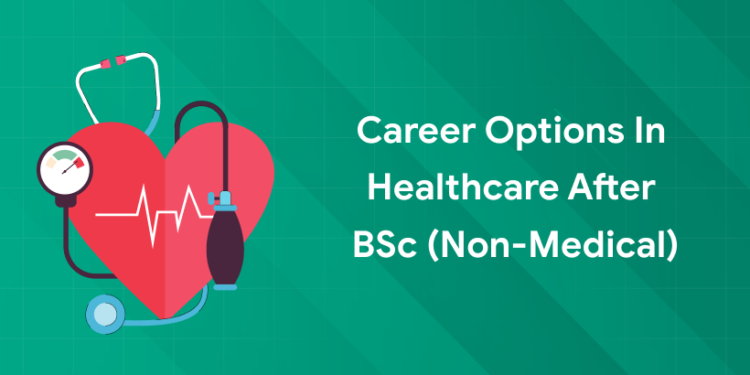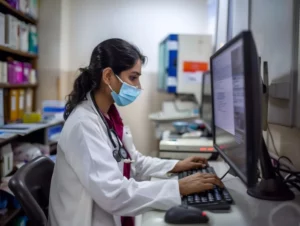Table of Contents
Key Takeaways:
- Graduates with a science degree in non-medical fields can pursue diverse healthcare roles beyond clinical professions.
- The healthcare sector offers expanding opportunities thanks to technology, policy shifts, and growing infrastructure.
- Upskilling with specialized certifications bridges knowledge gaps and accelerates career entry.
- Areas like hospital administration, research coordination, health analytics, and allied services are robust career avenues.
- Strategic, stepwise career planning enhances success and satisfaction in healthcare careers.
Introduction: Science Graduates Exploring Healthcare Careers
Graduating with a Bachelor of Science in fields like Mathematics, Physics, Chemistry, Botany, or Zoology is a proud achievement—one that opens doors to endless possibilities. But it’s natural to wonder: how can my non-medical degree translate into a meaningful, impactful career in healthcare? After all, healthcare is often associated with doctors and nurses, but the truth is, it’s a vast, dynamic ecosystem where diverse talents come together to save lives, improve patient experiences, and innovate for better health outcomes.
Your scientific training has equipped you with critical thinking, analytical skills, and a solid grasp of biological and physical sciences—foundations that are tremendously valuable to healthcare. Whether it’s analyzing health data to spot trends, managing the complex operations of a hospital, coordinating crucial clinical research, or ensuring quality and safety standards, there is a vital role waiting for you. The healthcare industry thrives not only on medical expertise but also on people like you who bring a fresh perspective and scientific rigor.
This journey may feel unfamiliar at first, but with the right guidance, training, and hands-on experience, you can transition smoothly and confidently. Together, we’ll explore how your non-medical BSc degree can become a powerful asset in healthcare. You’ll learn about the sector’s scope, discover practical steps for entry, and uncover career options that align with your unique skills and passions. Let’s embark on this rewarding path where science meets service, and your talents can truly make a difference in people’s lives.
Healthcare Sector Overview and Market Growth
India’s healthcare market is projected to reach $638 billion by 2025, representing one of the fastest-growing industries nationally and globally. Increased healthcare infrastructure, digital transformation efforts, and government initiatives toward accessible health services spur this growth.
This sector’s expansion demands a larger workforce with varied expertise—not only medical but also in hospital management, clinical research coordination, health informatics, and pharmaceutical quality control. Such roles require analytical capabilities, management skills, and a comprehensive understanding of healthcare operations, easily within the reach of non-medical science graduates who supplement their knowledge with specialized training.
The demand for skilled professionals in healthcare administration and allied roles is particularly strong, offering robust career prospects and competitive remuneration.
Step-by-Step Guide to Enter Healthcare After a Non-Medical BSc
1: What is the primary role of a hospital administrator?
Step 1: Identify Your Preferred Healthcare Domain
-
Explore healthcare fields that align with your scientific background and interest, such as hospital administration, clinical research support, health data analysis, or pharmaceutical quality assurance.
Step 2: Pursue Sector-Specific Education and Certification
-
Enroll in dedicated programs covering healthcare management, clinical protocols, and regulatory frameworks.
-
Prioritize recognized courses like the comprehensive Entri Hospital Administration Course in Kerala.
Step 3: Gain Practical Industry Experience
-
Participate in internships, volunteer programs, or entry-level jobs in hospitals, clinics, research labs, and healthcare companies to build real-world understanding.
Also read 16 Types of Healthcare Software
Step 4: Develop a Targeted Resume and Network
-
Highlight relevant scientific and healthcare training and experience.
-
Join healthcare forums, professional networks, and seminars to build connections.
Step 5: Apply for Suitable Healthcare Roles
-
Focus on non-clinical jobs such as hospital administration assistants, research coordinators, health informatics analysts, or lab technologists.
Also read: Hospital Administration Career Opportunities Abroad
Hospital Administration Course with Assured Career Growth
Hospital Administration Course by Entri App: Master essential healthcare management skills, gain certification, and secure top roles in leading hospitals
Join Now!Career Designations for Non-Medical BSc Graduates in Healthcare
| Career Title | Role Summary | Relevant Background |
|---|---|---|
| Hospital Administration Manager | Manage hospital operations, staffing, compliance. | Any science graduate with healthcare management training |
| Clinical Research Coordinator | Coordinate and manage clinical trials and research. | Science graduates interested in biomedical research |
| Health Data Analyst | Interpret healthcare data to improve decisions. | Mathematics, Statistics, IT backgrounds |
| Laboratory Technologist | Perform diagnostics and lab processes. | Botany, Zoology, Chemistry degrees |
| Quality Assurance Specialist | Ensure compliance and safety of healthcare products. | Chemistry, Biotechnology backgrounds |
| Pharmaceutical Sales Specialist | Interface pharma products with healthcare providers. | Chemistry/Life Sciences + communication |
| Healthcare IT Specialist | Manage hospital IT infrastructure and data systems. | IT proficiency + science knowledge |
| Public Health Coordinator | Implement community health programs and education. | Interest in public health initiatives |
| Medical Coding and Billing Expert | Manage medical billing and insurance-related coding. | Detail-oriented with coding training |
The Importance of Hospital Administration in Healthcare
Hospital administration is the backbone of an efficient healthcare system. Effective management of facilities, resources, human capital, and adherence to regulations are critical for delivering high-quality patient care.
Administrators ensure smooth hospital operations, optimize resource allocation, implement strategic initiatives, and maintain compliance with healthcare laws—fundamental to improving healthcare outcomes and patient satisfaction.
As India’s healthcare sector expands, the requirement for trained administrators is soaring. Well-prepared hospital administrators serve as a nexus linking clinical staff, patients, and regulatory authorities, driving innovation and operational excellence.
Non-medical graduates with managerial skills and healthcare domain knowledge are ideally positioned to contribute, especially when equipped through specialized courses.
Common Challenges Faced by Non-Medical Graduates Entering the Healthcare Sector
Transitioning into the healthcare sector with a non-medical BSc degree offers exciting opportunities but is not without challenges. Understanding these barriers is essential to prepare strategically and navigate this shift successfully. Here are some common difficulties and practical ways to overcome them:


1. Knowledge and Terminology Gap
Healthcare uses specialized medical and administrative terminology, which may be unfamiliar to non-medical graduates. This gap can lead to initial confusion in understanding protocols, documentation, and communication within healthcare settings.
Solution: Enroll in sector-specific courses like Entri’s Hospital Administration Course that teach healthcare vocabulary, workflows, and compliance requirements.
2. Lack of Clinical Exposure
Non-medical graduates often have limited or no hands-on clinical experience, which is valued in many healthcare roles. This lack can affect confidence and understanding of patient-centered environments.
Solution: Gain internships or volunteer in healthcare facilities to develop practical insights and contextual knowledge.
3. Perceived Career Uncertainty
The diversity and complexity of the healthcare sector sometimes lead to uncertainty about which roles align best with non-medical backgrounds. Misconceptions about job availability or suitability might discourage some from pursuing healthcare careers.
Solution: Conduct thorough research, seek guidance from industry professionals, and engage in career counseling to build clarity and confidence.
4. Competition with Specialized Healthcare Graduates
Graduates of medical, nursing, or allied health programs have directly relevant training, presenting stiff competition for healthcare positions.
Solution: Differentiate yourself through certifications, specialized training, and highlighting transferable skills such as analytical thinking, data management, and problem-solving.
5. Financial and Time Constraints for Additional Training
Quality healthcare certifications or courses can require investment of time and money, which may challenge recent graduates.
Solution: Explore scholarships, flexible online courses, and government-sponsored skill development programs. Entri offers modular, accessible programs tailored for working learners and fresh graduates.
6. Adapting to Healthcare Work Culture
Healthcare environments are highly regulated, fast-paced, and emotionally demanding, which can be overwhelming for those new to the sector.
Solution: Develop soft skills such as communication, empathy, teamwork, and stress management through workshops, mentoring, and practical exposure.
7. Regulatory and Licensing Requirements
Certain healthcare jobs require clearances, registrations, or licenses, which may not be immediately accessible to non-medical graduates.
Solution: Understand regulatory frameworks applicable to your chosen area, plan for exams or certification processes, and use recognized courses to gain eligibility.
Despite these challenges, many non-medical graduates successfully carve out impactful healthcare careers. With strategic preparation, ongoing learning, and gaining practical experience, you can overcome obstacles and thrive in this rewarding field.
Hospital Administration Course with Assured Career Growth
Hospital Administration Course by Entri App: Master essential healthcare management skills, gain certification, and secure top roles in leading hospitals
Join Now!Entri’s Hospital Administration Course in Kerala
Entri’s Hospital Administration Course in Kerala is an expertly designed 8-month diploma program tailored for graduates aspiring to enter healthcare management.
Course Highlights:
-
Intensive Classroom Training: 2 months of focused lectures on hospital management, clinical workflow, healthcare policies, and medical terminology.
-
On-the-Job Training: 3 months of real-world internship experience in reputed hospitals, strengthening hands-on skills.
-
Revision & Model Exams: 1 month dedicated to consolidating knowledge and assessment readiness.
-
Comprehensive Curriculum: Includes clinical management, healthcare IT software training, financial management, quality assurance, and patient care fundamentals.
-
Soft Skills Development: English language enhancement, interviewing skills, and professional communication.
-
Expert Faculty: Training by healthcare professionals and experienced administrators.
-
Placement Assistance: Dedicated cell facilitating job placements and career guidance.
This course is ideal for BSc non-medical graduates wishing to enhance healthcare management expertise and gain employment in hospital administration roles. It bridges scientific knowledge and healthcare sector understanding effectively.
Learn more about Entri’s Hospital Administration Course.
People also read: Entri Hospital Administration Course – FAQs
Conclusion
With India’s healthcare sector growing at a remarkable pace, driven by rising investments and public health focus, the demand for skilled professionals—especially those who combine scientific acumen with healthcare domain expertise—is at an all-time high. Non-medical BSc graduates can seize this opportunity by pursuing sectoral training that arms them with the knowledge and skills required to manage and innovate in healthcare environments. The Entri Hospital Administration Course in Kerala delivers this specialized education with practical experience and job support, equipping you to build a fulfilling, impactful healthcare career. Embark on this journey and be part of transforming healthcare delivery in India today.
Hospital Administration Course with Assured Career Growth
Hospital Administration Course by Entri App: Master essential healthcare management skills, gain certification, and secure top roles in leading hospitals
Join Now!Frequently Asked Questions
Can non-medical BSc graduates build successful healthcare careers?
Yes, non-medical graduates can excel in various healthcare administration, research, and technical roles by gaining sector-specific skills.
How can I acquire healthcare knowledge as a non-medical graduate?
Pursuing certification courses like Entri’s Hospital Administration Course provides comprehensive training in hospital operations and healthcare management.
What healthcare sectors are open to non-medical graduates?
Hospital administration, clinical research coordination, health data analytics, quality control, public health, and allied health services are great options.
Why is hospital administration important in healthcare?
Hospital administration ensures efficient and quality healthcare delivery through effective resource management and compliance, crucial in India’s growing healthcare ecosystem.
How can Entri’s course help me transition into healthcare?
The course offers practical knowledge, mentorship, hands-on training, and placement support specifically for graduates aiming to enter healthcare administration.
















